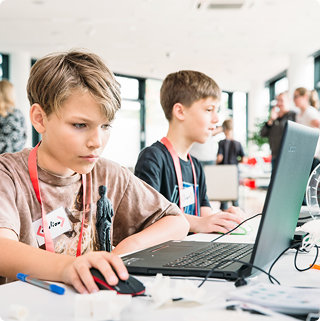
Technology is a part of our everyday life
We also recognise children are a particularly vulnerable group in today’s digital world and need special focus when considering the impact of technology and their human rights. We're committed to upholding child rights in all our business operations and supporting children and their parents to become responsible digital citizens.
We do this by providing up-to-date tools, guidance and conversations about safe and responsible conduct in cyberspace. Our Human Rights (including Child Rights) Policy sets out how we respect human rights throughout our operations.
Our commitments to broader child rights are also embedded in our group policies and processes: on the UN Convention on the Rights of the Child and Respecting the digital rights of the child.
Resources for child online safety
We recognise the increasing challenges for families and young people in a 24/7 connected world, including screen time, online safety, and the impact on physical or mental wellbeing. Vodafone is committed to creating solutions that help families navigate the digital world safely and appropriately.
How to find balance and positive online habits
We want everyone to get the most out of tech and enjoy happy and safe digital lives. These tips for online balance address these challenges while promoting positive digital habits.
Parental control tools
Our Secure Net service gives parents an added layer of control over screen time and can help block age-inappropriate website and apps.
Reducing screen time
Our new initiative is co-created by listening to teenagers and young people about ways we can offer them real-world activities and experiences.
Basic phones
Some parents and children wish to stay connected with one another without introducing full internet access on smartphones. That’s why we offer a range of ‘basic’ phones such as the Nokia 3310, which have limited 2G functionality and are not compatible with social media or other apps.
Resources and guidance
From our Digital Parenting Guide to partnerships with organisations like the NSPCC, we provide tools and advice to help families navigate the digital world safely.
Building digital inclusion
Through Vodafone Foundation, we’ve invested over £20 million across nine European countries to equip young people with essential digital skills.
Supporting educators
Vodafone’s training and tools for teachers are designed to boost digital skills across the education curriculum in areas like smart devices, AI, robotics, and augmented reality.

Supporting families in a digital world
We strive to help our customers feel safe and empowered whenever they connect. We believe being online is enriching, and that everyone deserves to enjoy it in a healthy, balanced and inclusive way.
We've always taken responsibility for helping parents and children through every stage of their digital journeys. We believe families are best placed to decide when to introduce phones and smartphones to their children. Our role is to provide a digital safety net, equipping parents with the tools to safely introduce their children to the online world. By guiding younger users through the internet basics, we help shield them from potential harm while they gain confidence in navigating the digital landscape.
As children grow into teenagers and young adults, their use of mobile devices evolves. We recognise the increasing challenges for families and young people in a connected world, including concerns around screen time, and the potential impact on physical or mental wellbeing from harmful content, bullying, grooming, scams, or a lack of meaningful real-world connections.
Some schools have agreed with parents that children should not have access to phones or social media at school unless for educational purposes. We support those decisions.
Our digital resource hub
Young people need to develop digital skills so they can overcome these challenges and maximise the benefits of the online world.
Our online resource hub supports parents, carers, teachers, young people and students, and covers everything from ‘how-to’ guides to expert advice and interactive learning tools to stay safe and happy in the digital world.
Resources for parents
CHILD SAFETY
Child safety and security solutions
We want everyone to get the most out of tech and enjoy happy and safe digital lives. Our child safety and security resources and support are here to help you make the right digital choices for your family.













































